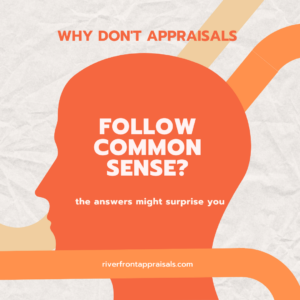
Property Taxes Just Went Up? We’ve Got You Covered!
It’s reassessment season for most folks in our area. Homeowners

In this blog post, which is part four in our 12-part series on Promoting Public Trust, we will introduce the topic of confidentiality. This very important part of the appraisal process affects homeowners, lenders, and every user of appraisals differently. And as it’s part of our Ethics Rule of USPAP, it’s extremely important to everyone! Read on to see how it affects you.
Please note that when you see italics, those words are not my own, but those of USPAP. Much of what I’ll cover here is taken right from the pages of USPAP, with my own commentary added as necessary.
We’ll begin this blog post discussing the appraiser’s responsibilities as it pertains to confidentiality, followed by a brief definition of confidentiality, and in part two of the blog – which will come later – we’ll wrap our discussion up by looking at some FAQs – most taken directly from USPAP, and a few of my own.
Three Rules of Appraiser Confidentiality
Just three rules, you ask? Well, sure there are more, but I’m just covering the basics here. The following four rules will form the basis for the rest of our discussion.
third parties as may be authorized by due process of law; or a duly authorized professional peer review committee except when such disclosure to a committee would violate applicable law or regulation.
That’s a lot of ‘must not disclose’ information, isn’t it? When we get to our FAQs in part two of this blog, you’ll get to see how this plays out in a typical appraisal assignment. Just to give you a teaser, though, something happened today in our office that is a perfect example of appraisals and confidentiality. We recently completed an appraisal for the sale of a home. The listing agent was calling every day to check on the status. Once she knew the report had been submitted, she wanted to know the value. When our office told her we can’t give out that information, she then pressed further. “Can you at least tell me if it appraised ok”. She was trying to be sneaky! However, even saying that it ‘appraised ok’ – which is code for ‘did it appraise for at least the sale price’ – would be a violation of confidentiality, because in that even slightly vague statement, we would have been making a statement about the results of our appraisal. We would have been telling someone other than our client that the home appraised for at least $120,000 (if that was the purchase price, for example). See how that gets really dangerous, really quickly?
What is Confidential Information?
Now that you know what’s essentially expected of all appraisers regarding confidentiality, let’s see what USPAP has to say about confidential information.
According to USPAP, Confidential information is defined as information that is either:
identified by the client as confidential when providing it to an appraiser and that is not available from any other source; or classified as confidential or private by applicable law or regulation.
I’m not going to spend any time on that which is classified as confidential by law or regulation. But what about the first part of our definition above? What items might a client consider confidential? And what are some things ‘not available from any other source’?
Essentially, a client can identify anything they want as confidential. Maybe it’s the fact that you’re appraising the home in the first place. Or maybe it’s just the borrower’s name. Anything can be classified as confidential, but it must be done by the client. As for information not available from any other source – that speaks to the appraiser’s conclusions and opinions – anything that is not a fact, or part of public record (like the appraised value we discussed earlier). The appraiser’s opinion of the home’s condition or quality, the conclusion of highest and best use; the value. These are all examples of items that must be kept confidential. And we’ll talk about others in the next section. Stay tuned!
Helping homeowners navigate the appraisal process,
Ryan Bays, SRA, AI-RRS

It’s reassessment season for most folks in our area. Homeowners

I feel like we all need a laugh. How about

So this may be a slight break from the norm,
Riverfront Appraisals has been providing comprehensive valuations of residential properties to Western Kentucky and Southwestern Indiana since 2008.